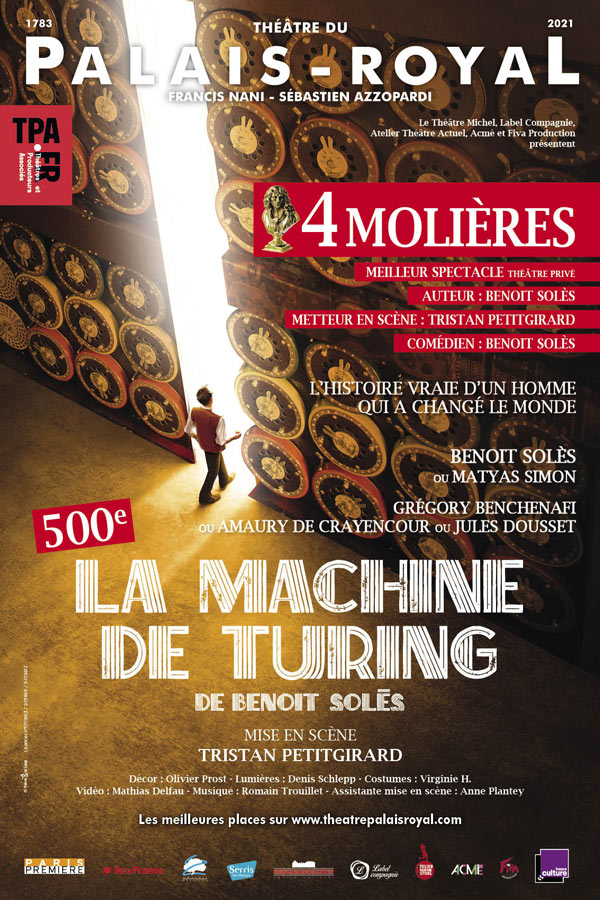For their first film on the small screen, Eric Toledano and Olivier Nakache tackle the question of the unconscious. And, they look back on a significant period in our history. In therapy, thenew ARTE series explores the impact that collective trauma can have onindividual anxieties. A subject that resonates with the current period of upheaval. The internal conflicts of the characters are the heart of the enigma. A singular and moving series, carried out by admirable avectors of e sensitivity.
Therapy on Dr. Dayan's couch
Paris, November 2015. In the aftermath of the Bataclan attacks, five patients in a state of shock confided in Dr. Philippe Dayan. They are in an existential crisis. If their anxieties predate the attacks, the situation of chaos has reactivated the traumas.
Everyone has their personal story and their reasons for going wrong. Everyone has their own relationship to therapy. Some pretend not to believe it, not to admit their fragility. But deep down, everyone is looking for the same thing: for a professional to help them better understand who they are, and to reveal to them certain truths that they are hiding from themselves. Because in analysis, the relationship to the truth is complex. There is what one comes to say, and what one comes not to say to his analyst. While hoping he notices. Empathetic and benevolent (in appearance), Philippe Dayan tries to bring the unconscious to their consciousness.
Group therapy
The anxieties that play out in Dr. Dayan's office are universal. The life that damages and unties the links. The anguish of the passing of time. The fear of death, particularly prevalent in this climate of chaos. In therapy speaks of individuals in suffering, who seek to unravel the knots of their existence. Men and women unable to make certain decisions, and who become entangled in their contradictions. All in a shocked society that has experienced horror. But also, an ultra-connected society where paradoxically, communication between individuals is increasingly difficult. There is a little bit of ourselves, in each of these patients. As a privileged witness to these moments of intimacy, the viewer can also bend to the game of analysis. And follow vicarious therapy.
Thelongest night of their lives
Ariane has just spent "a very, very long night fighting against death". For forty-eight hours, it operated non-stop on the wounded of the attacks. But she refuses admiration. "I did my job," she says coldly, as if to distance herself from what she has just experienced. Adel is a cop. Group leader for the BRI. He entered the Bataclan just after the massacre, while the terrorists were still inside. Dayan asks him about what he saw, and experienced. "What happened to you in this?" Like Ariane in the emergency room, it was the silence that first struck Adel. A dead silence. Like Ariadne, he doesn't want people to say he's a hero. Like Ariane, he speaks of "job": "We are trained and paid for it". A "we" that protects him from his personal emotions. And above all, Adel has no right to flinch. Not now.
In denial
Adel and Ariane refuse to admit the obvious : what they experienced has deeply marked them. However, Ariane claims that the crisis with her companion has nothing to do with the attacks. As for Adel, Dayan he "sees it coming", with his shrink boots. A phrase he repeats several times during the session.
Damien is waiting for his wife Leonora. They do couples therapy. She's late, doesn't answer the phone, which puts Damien off. "The day after the attacks, she put her mobile phone on silence!" He calls Leonora's office and the secretary tells him that she left in the early afternoon. "Alone?" he asks, anxious. Damien is in denial of an eye-popping truth: he is sick with jealousy. He ends up calling his mother-in-law, who doesn't know where her daughter is. But obviously she worries, recalls, and Damien takes on exasperated airs: "I opened the floodgates of maternal hysteria".
Rancoeur and culpabilité
Two feelings that go so well together… As he had just entered the Bataclan, a hand clung to Adel's leg. A hand emerging from the "piles". But he didn't stop. That is the protocol. The BRI secures and then the rescue intervenes. Adel clings to protocol like a lifeline. Nevertheless, Adel blames himself and since then, this moment does not leave him. He also blames himself for being there, in therapy, while the terrorists are still in the wild. Then a memory resurfaces. When his mother died, he resented his father for not cracking.
Ariane feels guilty for having wanted another man than Cédric, her companion. To whom she blames for having given her an ultimatum " at the worst time": live together or separate. She is angry, Dayan tempers: "After a major trauma, people are in fear and need to hold on to something."
Anger therapy
"I'm not anxious, I'm angry," Adel said. Angry at his helplessness in the face of horror, at politicians, humanitarian bobos, intellectuals like Dayan, locked in their world and who did nothing to prevent "it". Angry with himself, because he feels he is losing control. Adel is bad, but he does not have time to get better, he is responsible for human lives. It's an emergency. He came to Dayan to find a solution, after all it is "his job".
Ariane is angry with Cedric. Camille against her mother. Léonora against Damien who does not understand that she does not want a new child. Dayan against his wife, a "phallic mother" who suffocates their eleven-year-old boy… The attacks have awakened an anger that is expressed in all directions.
Difficult to talk about yourself
These patients share the same difficulty in saying things about themselves. And objective things. Camille, a sixteen-year-old girl who "basic" had not come to talk about her. Following a bicycle accident, Camille needs a second opinion for insurance, certifying that she is not suicidal. Camille is reminiscent of Adel, who would like Dayan to guess who he is without having to talk about him. A bit like psychics, who can predict the fate of individuals just by seeing a photo of them.
Leonora, she declares that she does not want to keep the baby, and in front of the discomfited faces of Dayan and Damien, bursts out laughing: "It's okay, I was convincing enough?". She claims that she played a character, that she exaggerated her fears but what she has just said is convincing. As with Adel, Camille and Ariane, something in her needed to be heard.
The encounter with oneself
Camille is a swimming champion, she is part of the selections for the next Olympics: "I'm not in the," she says. Words that say a lot about his inner conflicts. Even though she says she's used to pressure, Dayan doesn't believe it. Would Camille have caused this accident to escape a responsibility too heavy for her?
"Here, you can have great moments of vertigo," Dayan tells Camille. Vertigo of the revelation of unconscious desires that escape our consciousness. Vertigo of the encounter with oneself, this "being" that we think we know but which often remains a mystery. Becoming aware of the motivations that push us to act is a discovery that can make us waver. " What happens to patients in this office is not always what they expect. And it's not always fun," warns Dayan.
In search of a look
All seek an outside look at themselves to resolve their internal conflicts. And to get out of their anxieties and contradictions. But also a look that reassures them. In the case of Damien and Leonora, who are tearing themselves apart before Dayan's eyes, it is a request for assent. This disunited couple would like their therapist to choose for them. Should they keep the child Leonora is expecting?
Or on the contrary, a request for disapproval. Like Ariane, who tells Dayan about her escapades with a nurse in one of the hospital offices. Ariane feels guilty and expects her analyst to be disgusted by her story. Perhaps that would reassure her. But Dayan does not enter into the game of emotions. What she did, Ariane calls it "the tail stroke after the scalpel stroke". Dayan more elegantly calls it "the life drive".
The analyst analyzed
Shrinks are not immune to derailing. And it is because he feels that he is going to be derailed that Dayan contacts Esther after twelve years of silence. Esther is a shrink, and she is a friend. For ten years, she was his "controller". Dayan went to therapy with her. That is the protocol. Except that since Esther, he no longer has a controller. But he doesn't tell her right away. He begins by telling her about his weariness. He has lost the "taste", finds all his patients predictable. Then he continues on his relationship problems. On the night of the attacks he was drinking after arguing with his wife. While Paris was on fire and blood. Guilt. Listening to his patients made him aware of it. "I have been cut off from the world for too long and the awakening is brutal." Here he is angry.
In therapy Adapted from the Israeli series "BeTipul" Directed by Eric Toledano and Olivier Nakache With Frédéric Pierrot, Mélanie Thierry, Reda Kateb, Céleste Brunnquell, Carole Bouquet, Clémence Poésy, Pio Marmaï. Broadcast on Arte on Thursdays at 20:55 until March 25. The entirety of season 1 can be found on Arte.fr Find the review of the new series of Canal plus UFO (s).






































